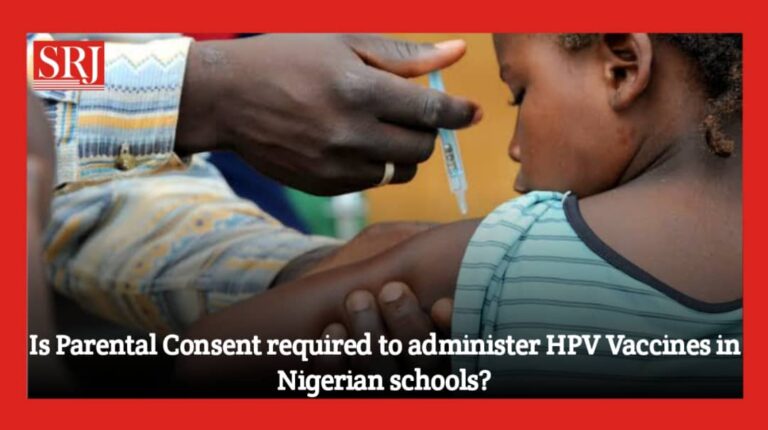Our Education Lawyers examined how crucial parental consent is to HPV (Human Papillomavirus) vaccination in Nigerian schools. The Executive Director of the National Primary Health Care Development Agency disclosed that the federal government will roll out HPV vaccines on 25th September 2023.
The Background
The HPV vaccine allegedly seeks to immunize Girls ages 9 to 15 against cervical cancer. Social media groups of parent-teacher associations that our education lawyers belong to are heated with the debate around the propriety and potency of the HPV vaccine – a genuine concern among parents.
Globally, HPV vaccines have been opposed as ineffective and needless. Dr Wahome Ngare, a renowned Kenyan Gynecologist, insists that it is essential “to delink HPV prevention from preventing cancer of the cervix. There are cheaper and safer ways of dealing with cervix cancer than vaccinating all our girls.”
Dr. Wahome Ngare maintained that at a “personal level, I have explained to my daughter that the best way to avoid ALL STD’s is sexual morality, and I will continue to pray that she makes the best choices. I then wrote a formal letter to her school with clear instructions not to vaccinate her. After she is 18 and feels differently, she can make her informed choice.”
Miller & Zios, a United States law firm, announced that its “lawyers are reviewing Gardasil vaccine lawsuits in all 50 states for victims who have suffered side effects from the Gardasil HPV vaccine. Deaths and injuries have been linked to this vaccine.”
Miller & Zios claimed that HPV vaccines administered to their clients caused unexpected medical diseases, including premature ovarian failure and menopause.
We do not pretend to have the competence to resolve the moral and professional agitations surrounding the propriety of the HPV vaccine on Girls ages 9 to 15 in Nigeria.
This commentary focuses on guiding education administrators, parent-teacher associations, and parents of primary and secondary school pupils and students in Nigeria on cooperating with the federal government’s public health efforts or managing parental consent under Nigerian law.
What is parental consent?
A combined reading of Nigeria’s National Health Act[1] and Code of Medical Ethics[2] shows the legal basis for parental consent. A medical service user (patient) enjoys unlimited information rights under the National Health Act.
Where a patient is a child, the patient will include the patient’s parent or guardian, or another person authorized by law to act for the patient or the patient’s parents[3].
The Code of Medical Ethics in Nigeria describes informed consent as the permission granted in full knowledge of the possible consequences, typically given by a patient to a doctor for treatment with knowledge of the potential risks and benefits.
Parental consent to HPV vaccination occurs when the guardian or parent of pupils or students says yes to the girl-child receiving HPV vaccines in Schools.
Is Parent Consent Absolute?
A Nigerian Court that includes a Magistrate can override parent consent in emergencies. The law protects life and preserves its citizens’ fundamental rights, including infants.
A court of law cannot stand by and watch a child being denied basic life-saving medical treatment based on the religious conviction of his parents[4].
Our education lawyers espouse the view that HPV vaccination is not a dire medical procedure that allows a Court of Law to override parental consent.
Nigerian Courts are unlikely to qualify HPV vaccination as an emergency or dire medical need and override parental consent over girls ages 9 to 15.
No provisions of the Universal Health Coverage (UHC), Sustainable Development Goals (SDGs), National Health Act 2014, National Health Policy 2016, and National Vaccine Policy 2021 could be reasonably stretched to authorize a court of law to override parental consent to HPV vaccination.
Options Open to Education Administrators
Consistent with a school’s legal and ethical responsibility to pupils’ and students’ safety and well-being while on its premises, obtaining parental consent for HPV vaccinations demonstrates respect for parental rights, promotes trust, and shows cultural sensitivity.
HPV vaccination is not mandatory in Nigeria. Parents have the right to make informed decisions about their children’s healthcare. By requiring parental consent, schools empower parents to make informed choices about whether their child should receive the HPV vaccine, considering factors such as their health history and individual circumstances.
A school administrator should work with parents or parent-teacher association to open a physical consent register or use digital forms such as Google or Microsoft to collate parental consent to the HPV vaccination in Nigeria.
A customer-centric approach requires school administrators to allow parents to register consent or withhold consent to the HPV vaccine using multiple options, including SMS (short message services) or text, WhatsApp, and telephone calls.
The administering ministry or government agency must have a digitized registry of biographical data of girls who received the HPV vaccine – given the potential side effects of HPV vaccines on girls ages 9 to 15.
In summary, school administrators in Nigeria should consider obtaining documented parental consent for HPV vaccination to uphold legal and ethical responsibilities, respect cultural diversity, build trust, assess individual risk factors, maintain proper records, protect against legal liability, and promote awareness about the importance of HPV vaccination.
Schools’ admission packs and general terms and conditions do not include delegated authority to administer routine medications unless in emergencies.
Documented parental consent to HPV vaccination ensures that decisions are made collaboratively, considering the unique needs and preferences of each student and their family.
[1] S. 23 National Health Act 2014.
[2] section 19 of the Code of Medical Ethics in Nigeria
[3] S.64 National Health Act 2014.
[4] Tega Esabunor & Another V. Dr. Tunde Faweya & Others (2019) LPELR-46961(SC).

